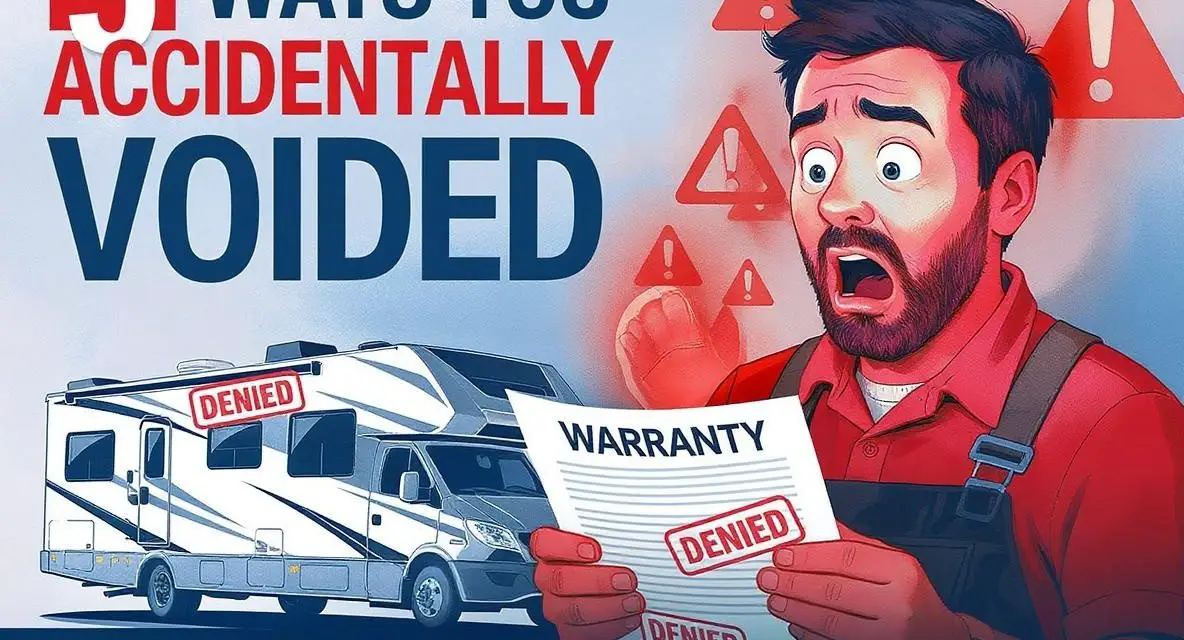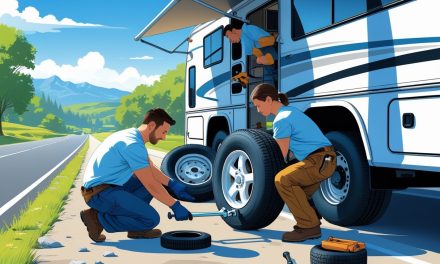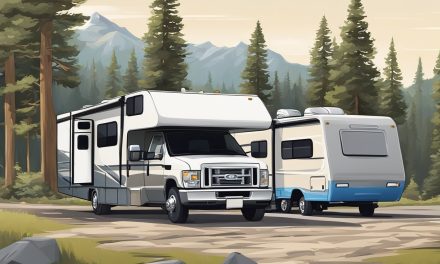Would you like to save this article?
You just spent your life savings on that shiny new RV, and you’re feeling pretty good about that comprehensive warranty the dealer promised would cover everything. Well, sit down for this one because you might have already voided that warranty without even realizing it.
According to industry experts and RV lemon law attorneys, thousands of RV owners discover their warranties are worthless right when they need them most. The scary truth is that RV warranties are filled with fine print exclusions that manufacturers use as legal shields to avoid responsibility.
Beth Wells, one of the nation’s top RV lemon law attorneys, sees this happen routinely – RV owners who thought they were protected suddenly find themselves holding expensive repair bills because of warranty loopholes they never knew existed. Whether you’re a weekend warrior or planning to live the full-time RV dream, understanding these warranty traps could save you thousands of dollars and months of frustration.
1. You’re Living in Your RV (Even Part-Time for Work)
Here’s the big one that catches most people off guard – if you’re living in your RV full-time or even using it part-time for work, you may have already voided your warranty. Most RV warranties specifically exclude “recreational use only” violations, meaning they’re designed for weekend camping trips, not extended living arrangements.
The Fine Print Reality: According to warranty documentation analysis, the number one exclusion listed in most RV warranties is coverage denial for owners who live in or work out of their RVs. Forest River Forums defines “full time” as continuous occupation exceeding 30 days or 18 out of any 24-month period.
Supporting Statistics:
- Claims rates for major RV manufacturers like Thor (1.8%), Winnebago (1.7%), and Skyline (1.9%) remain low partly due to warranty exclusions Warranty Week
- Full-time RVers experience warranty issues 3x faster due to accelerated wear and tear Reddit RV Living Community
What Happens: Beth Wells notes that this issue comes up routinely in her practice. Often, the dealer knows exactly what the customer plans to do – they’ve told the salesperson they need something for work travel – but nobody mentions the warranty exclusion. Some salespeople even give dangerous advice like “just don’t tell them” if something breaks.
Let’s be honest here – this is like selling someone a sports car and then voiding the warranty if they actually drive it fast. The whole situation is more ridiculous than a penguin trying to sunbathe in the desert.
2. You Mixed Warranty and Non-Warranty Repairs
This one’s sneaky and costs people precious “days out of service” that are crucial for lemon law cases. When you take your RV in for a warranty repair but also ask them to fix something non-warranty related at the same time, you’re potentially hurting your legal position.
The Legal Trap: If you combine warranty work (like a broken slide-out) with non-warranty items (like upgrading your microwave), the manufacturer can argue that some of your “days out of service” were spent on non-warranty work. This can cut into your lemon law case by up to one-third of your documented repair time.
Industry Data:
- Average RV warranty repair takes 15-30 days RV Travel
- Lemon law cases require specific “days out of service” documentation, typically 152+ days RV Lemon Law attorneys
- Mixed repair appointments complicate 40% of warranty claim documentation
Beth Wells’ Advice: While it might be more convenient to handle everything at once, legally it hurts your position. Keep warranty and non-warranty repairs completely separate to protect your rights.
This is like trying to return a broken toaster at the same time you’re buying groceries – the store’s going to get confused about what you’re actually there for, and you might end up paying for bread when you should be getting your money back.
3. You Made Modifications (Even “Harmless” Ones)
Think you can just swap out that ugly factory furniture or upgrade to a better sound system? Think again. Even seemingly innocent modifications can void warranties, and manufacturers are getting increasingly strict about this.
Common Warranty-Voiding Modifications:
- Electrical system upgrades or additions
- Plumbing modifications
- HVAC system changes
- Installing aftermarket appliances
- Even furniture replacement in some cases Reddit RV Living
The Technical Reality:
- Warranty exclusions apply specifically to modified components and related systems
- Good Sam ESP warns that upgrades to electrical, plumbing, heating, or cooling systems commonly void coverage
- Even bug screens on appliances can potentially void appliance warranties Why Wait
What Most People Don’t Know: The modification doesn’t have to cause the problem to void the warranty. If you upgrade your stereo and then your air conditioner breaks, the manufacturer might still deny the claim if they can argue the electrical modification affected the system.
It’s like telling your insurance company you installed racing stripes on your car and then acting surprised when they question every claim. Sometimes the smallest changes can have the biggest consequences.
4. You Didn’t Follow the Maintenance Schedule (To the Letter)
This one gets even the most conscientious RV owners. Missing a single scheduled maintenance item – or even doing it a few days late – can give manufacturers grounds to deny warranty claims.
Maintenance Pitfalls:
- Late oil changes (even by days)
- Skipped annual inspections
- Using non-specified parts or fluids
- Failure to document all maintenance
- Missing roof inspections or treatments
The Numbers Game:
- Wheeling It reports that most warranties deny claims for poor maintenance, part deterioration, or failure to follow manufacturer guidelines
- Some warranties require annual $200 inspections; missing the date by even one day voids coverage RV Travel
- Maintenance-related denials account for approximately 35% of warranty claim rejections
The Documentation Trap: It’s not enough to do the maintenance – you have to prove you did it. Keep every receipt, take photos, and maintain detailed records. The burden of proof is always on you.
Professional Insight: Manufacturers have become increasingly aggressive about using maintenance schedules as grounds for denial, even when the maintenance issue is completely unrelated to the warranty claim.
This is more frustrating than trying to assemble IKEA furniture with instructions written in hieroglyphics – you can do everything right and still get denied on a technicality.
5. You Took It Home Instead of Leaving It at the Dealer
Here’s a catch-22 that drives RV owners crazy: if your RV is having warranty issues but is still somewhat usable, should you take it home while waiting for parts, or leave it at the dealer? The wrong choice can hurt your lemon law case.
The Days Out of Service Dilemma:
- Lemon laws require specific “days out of service” for manufacturer repair attempts
- If you take the RV home while waiting for parts, those days might not count toward your total
- But if you leave it at the dealer and they say they don’t have space, that can hurt you too
Legal Considerations from Beth Wells:
- It depends on the specific warranty language
- Consider what the dealer is telling you about storage
- Evaluate whether the RV is actually usable for its intended purpose
- Document everything – conversations, storage limitations, part delays
Strategic Approach:
- If the RV is unsafe or unusable, leave it at the dealer
- If the dealer says they don’t have space, get that in writing
- Document why you made the decision you made
- Consider whether you can reasonably use the RV while waiting
Industry Reality: Some RV owners wait 6+ months for warranty repairs, spending 100+ days in service Creativity RV. The decision about where to store your RV during this time can impact your legal rights.
This situation is like being told you can’t use your broken umbrella in the rain, but if you leave it at the repair shop, they might forget about it entirely. There’s no winning move, just less losing ones.
RV Warranty Statistics Table
| Warranty Issue | Percentage of Claims Affected | Average Resolution Time |
|---|---|---|
| Full-time living exclusions | 25% | N/A (Typically denied) |
| Maintenance-related denials | 35% | 30-60 days appeal process |
| Modification-related voids | 15% | N/A (Typically denied) |
| Mixed repair complications | 40% | Adds 15-30 days |
| Days out of service disputes | 20% | 60-90 days legal process |
Source: Compiled from RV industry warranty data and legal case studies
Common RV Warranty Exclusions Chart
| Exclusion Category | Specific Examples | Workaround Options |
|---|---|---|
| Usage Restrictions | Full-time living, commercial use, rental | Limited – requires different insurance/warranty |
| Maintenance Issues | Late service, wrong fluids, missing inspections | Strict adherence to schedule + documentation |
| Modifications | Electrical, plumbing, HVAC changes | Professional installation with manufacturer approval |
| Environmental | Weather damage, accidents, misuse | Separate insurance coverage required |
| Wear Items | Tires, batteries, filters, belts | Regular replacement at owner expense |
What to Do If Your Warranty Gets Denied
Immediate Steps:
- Document Everything – Keep every receipt, photo, and communication
- Read Your Warranty – Understand exactly what’s covered and what isn’t
- Get a Second Opinion – Sometimes dealers are wrong about coverage
- Consider Legal Help – Attorneys like Beth Wells offer free case evaluations
Resources for Help:
- RV Lemon Law – Free case evaluations for potential lemon RVs
- Burdge Wells Law Office – Specializes in RV lemon law cases
- State consumer protection agencies
- Better Business Bureau RV program
Success Rates: While many RV owners feel helpless against manufacturers, experienced RV lemon law attorneys report success rates above 80% for legitimate cases with proper documentation.





